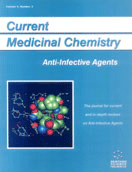Abstract
Inhibitors of HIV protease have been key components of highly active retroviral therapy, which is credited with dramatically reducing the mortality and morbidity associated with HIV infection. Nevertheless, currently available therapies are insufficiently effective in a significant proportion of infected patients; furthermore, even successful therapy may prove to be of limited durability over time. In particular, the emergence of highly resistant viral strains presents a serious threat to continued success in treatment of AIDS. Patient noncompliance, exacerbated by complex dosing schedules and unpleasant side effects, not only compromises efficaciousness but also contributes to emerging resistance. For these reasons it is necessary to continue bringing to market new agents which show greater potency against resistant mutants, as well as decreased toxicity and more favorable pharmacokinetic properties which should lead to improved patient compliance. This paper summarizes recent developments in HIV pr otease research, with emphasis on compounds or structural classes which may show promise for clinical development.
Keywords: Hiv protease inhibitors, saquinavir, ritonavir, indinavir, nelfinavir, amprenavir, lopinavir, Protease inhibitors, Amprenavir analogues, fosamprenavir
 3
3

